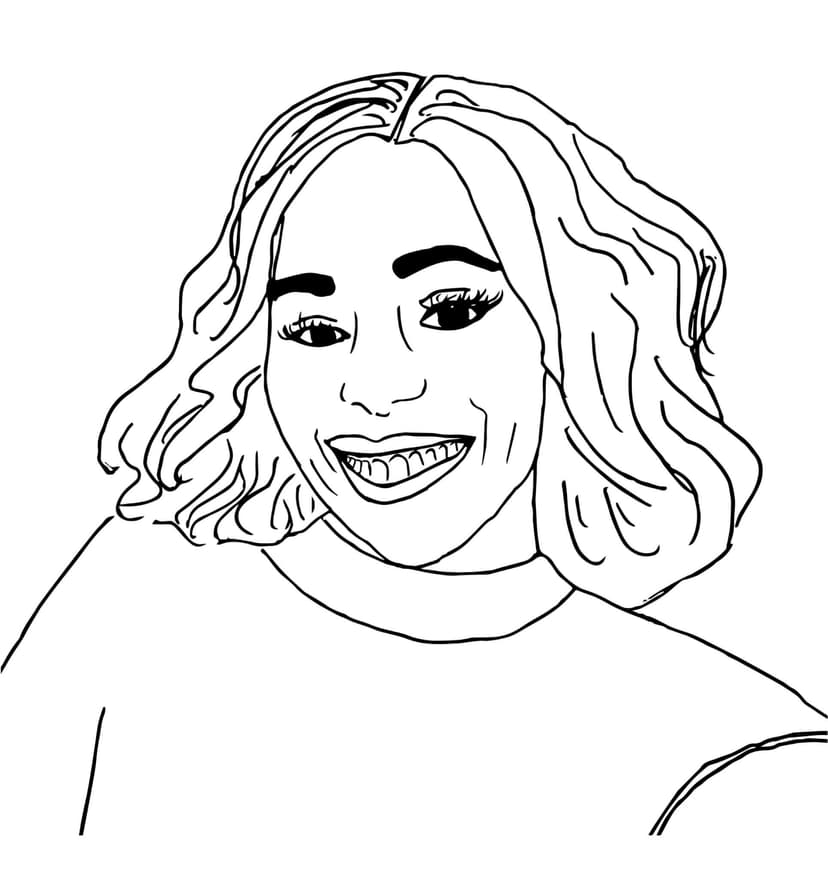On February 26, my family and I entered the National Center of Afro-American Artists (NCAAA) in Roxbury for the first time for the City of Boston Equity and Inclusion Cabinet’s All Black Everything event. The culmination of their Black History Month event series, this program featured singing, poetry, live visual art, food, and DJing by a range of Black artists, many of whom call Roxbury their home. Prepared plates of food catered from Cheryl Straughter’s Soleil Cafe—a soul food restaurant in Nubian Square—greeted us on our way in, along with desserts by Carlene O’Garro’s Delectable Desires Pastries. This was intentional: “Food brings us together as Black people. My parents are from the Caribbean. Every event we’ve ever gone to, there’s food. We wanted to have that family vibe—we’re all one people,” said Susan McCollin, administrative and project coordinator for the cabinet.
Online • Mar 14, 2023
At “All Black Everything,” the Museum of NCAAA Came to Life with a Community Celebration
A recap of the day-long event that activated the art space through performances, music, and visual art in celebration of Black History Month.
Feature by Niara Simone Hightower
Singer Ashley Villard performing inside the NCAAA gallery space as part of All Black Everything on February 26, 2023. Photo by Bluebird Productions. Photo courtesy of City of Boston Equity and Inclusion Cabinet.
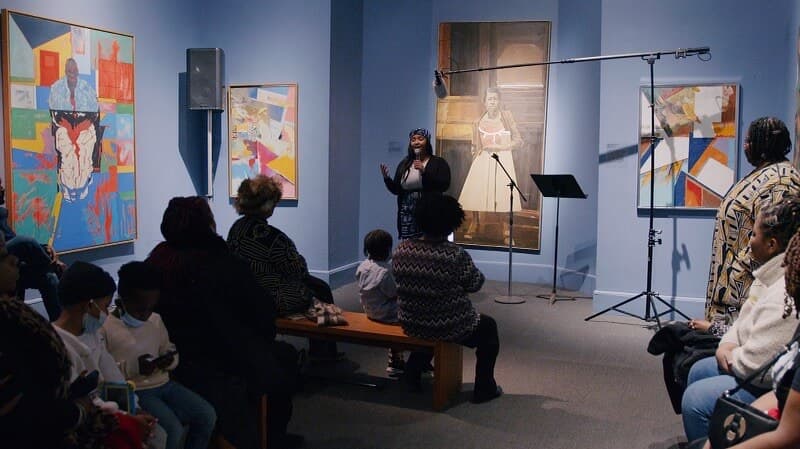
Singer Ashley Villard performing inside the NCAAA gallery space as part of All Black Everything on February 26, 2023. Photo by Bluebird Productions. Photo courtesy of City of Boston Equity and Inclusion Cabinet.
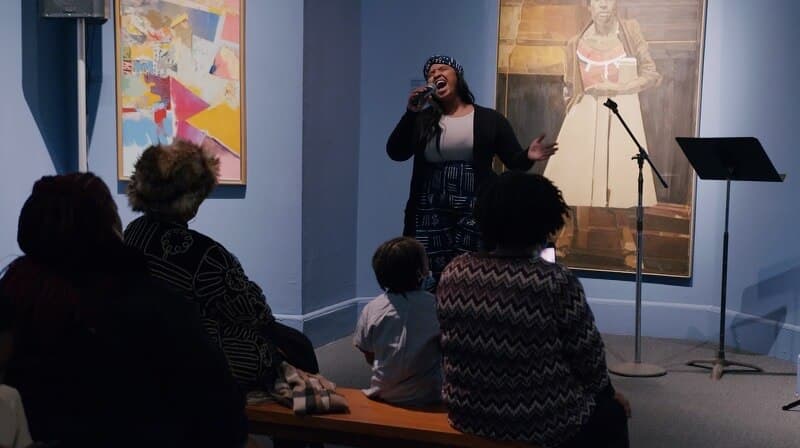
Singer Ashley Villard performing inside the NCAAA gallery space. Photo by Bluebird Productions. Photo courtesy of City of Boston Equity and Inclusion Cabinet.
The day-long open house began with a robust lineup of performers in front of a multigenerational audience. Singers Ashley Villard and Serenity Bullock—who’ve both performed in NCAAA’s Black Nativity, an annual production of Langston Hughes’s Christmas gospel song-play—made a special appearance. Afterwards, multidisciplinary spoken word artist Amanda Shea rose to the stage with a captivating voice. She presented two of her works, “Resilience” and “Black Excellence,” musing on the multifaceted experiences of Black people: “Weight on her shoulders she carries worlds around / We simply orbit in her Universe / Even when she’s lost in her own space / Who will carry her burdens?” Shea breathed in “Resilience.” In “Black Excellence,” she declared, “It’s cosmic, it’s spiritual, it’s GOD / We sprinkle all that razzle dazzle on everything / No matter societal conditions, restraints or tactics / We thrive Periodt / The epitome of Black Excellence.” Shea finished her performance with a call and response that took on singing and spoken word. Collectively, we chanted: “I am surrounded by love.” With each utterance, it rang louder. As I repeated her words I felt freer, coming back to myself and those connected to me.
Then soul soundscapes curated by the DJ traveled throughout as everyone roamed—and sometimes danced around—the NCAAA gallery spaces, both chatting and silently observing. The DJ was none other than Chris Grant, cofounder of Black Market in Nubian Square. As afternoon turned to evening, Edmund Barry Gaither, founding director of the NCAAA, gave enthusiastic tours of the permanent exhibition “ASPELTA: A Nubian King’s Burial Chamber.” Visitors also explored the artworks on view, many of them by local Black artists and portraying Black subjects. From an endearing and curious photograph of a Black boy just above the surface of shadows (Rudolph Robinson’s Ome), to a politically charged pastel mural study of Black woman maternity, later painted in the South End as a part of Boston’s Black art and mural movement (Sharon Haggins Dunn’s Mural Study), to paintings of Black women artists in Boston and NCAAA’s renowned founder herself—Dr. Elma Lewis—to jazzy mixed-media collage, lithographs, and abstraction, the possibility of Black art space vibrated throughout the rooms.
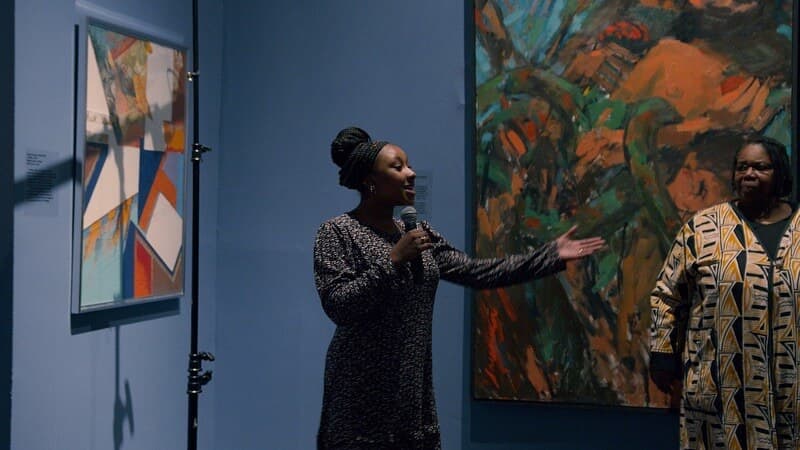
Youth singer Serenity Bullock performing inside the NCAAA gallery space. Photo by Bluebird Productions. Photo courtesy of City of Boston Equity and Inclusion Cabinet.
Founded by Dr. Elma Lewis in 1968, the NCAAA “celebrates the artistic contributions of Black people locally and globally.” At the intersection of arts and culture, public service, and social justice, the NCAAA has organized acclaimed exhibitions and programs and collected thousands of objects over the years. Since Covid-19, the Museum of the NCAAA has been temporarily closed to public visitation due to ongoing and much-needed construction. However, the NCAAA continues to present programs and events, including their annual Black Nativity, Juneteenth Emancipation Observance, and Big Head Community Festival—and yes, “Big Head” warmly alludes to the sizeable bronze sculpture in front of the museum, Eternal Presence by Roxbury-raised artist John Wilson. Activating the museum space for All Black Everything thus provided our community another opportunity to engage with the institution. According to McCollin, “We wanted a space that speaks to the history of Black people in Boston.… I noticed it [the Museum of the NCAAA] was closed and felt that was so unfortunate. So we reached out to Mr. Gaither to see if he would open it up for us. That became a possibility.”
For Amanda Shea, who lives close by, being in the museum for All Black Everything was a “full circle moment as a performer.” She noted, “There’ve been so many historical moments in my career in that space,” and “It [the Museum of the NCAAA] speaks to our legacy. And that’s the only museum where we see a reflection of us all the time. It’s important for the youth to see and feel.” She added, “I wonder what it would look like to really invest in these spaces.”
Witnessing the power of a Black art museum in Boston, and of one with such influence in and beyond New England, felt like a rare opportunity that day. But that shouldn’t be the case. Seeing the turnout from this program, it’s clear our community is eager to get back into the museum and to gather with one another in celebration of Boston’s Black artists. While the museum has plans to reopen in the late summer or the fall, financial support and showing up continues to matter.
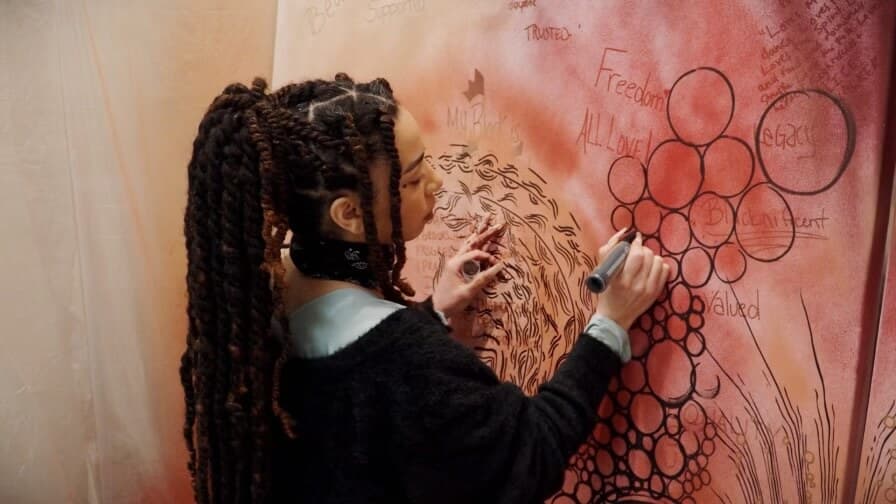
Artist Sagie Vangelina live painting I AM at All Black Everything. Photo by Bluebird Productions. Photo courtesy of City of Boston Equity and Inclusion Cabinet.
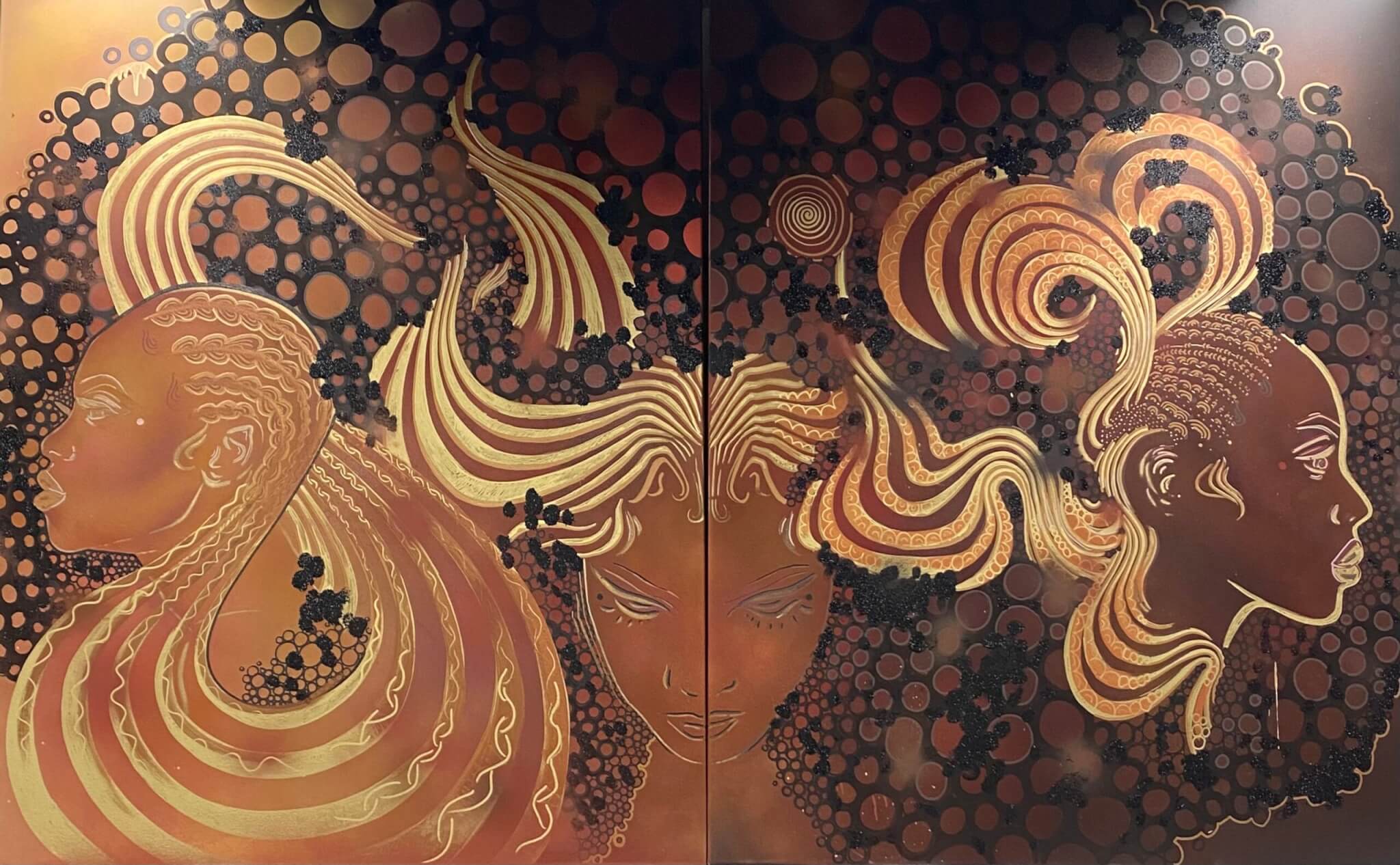
Sagie Vangelina, I AM, 2023. Spray paint, acrylic, enamel, and glitter on canvas. 5′ x 8′. Photo by the artist.
Attendees also watched Afro-Dominican artist Sagie Vangelina create a live painting on a canvas and living archive full of words like “My Black is beautiful” and “Live in my truth.” The canvas came from the cabinet’s Sankofa Night at Black Market on February 9, during which participants wrote intentions for the Black diaspora—“what they hoped, what they wished and dreamed for Black people,” said McCollin—on a board while experiencing dance, poetry, live music, and a Black vendors market, as well as having a conversation about the legacy of anti-Blackness. Vangelina’s painting responded to the prompt of painting Black resistance, based on the national Black History Month theme. As Vangelina painted three majestic Black woman figures in her abstract expressionist style, the words on the canvas gradually blended into the DNA of the artwork, radiating below layers and layers of work. A community of voices thus resonates at the painting’s foundation. The three Black women, varying in skin tone and hair texture, wear cornrows that expand and interconnect in a flowing network—like dream highways, or portals. They are the pillars of a world of its own. Any Black woman can see themselves in it: As McCollin said, “It feels like it’s me.” Vangelina continued to work in her studio, and now the final product, titled I AM, will hang in City Hall for all to see.
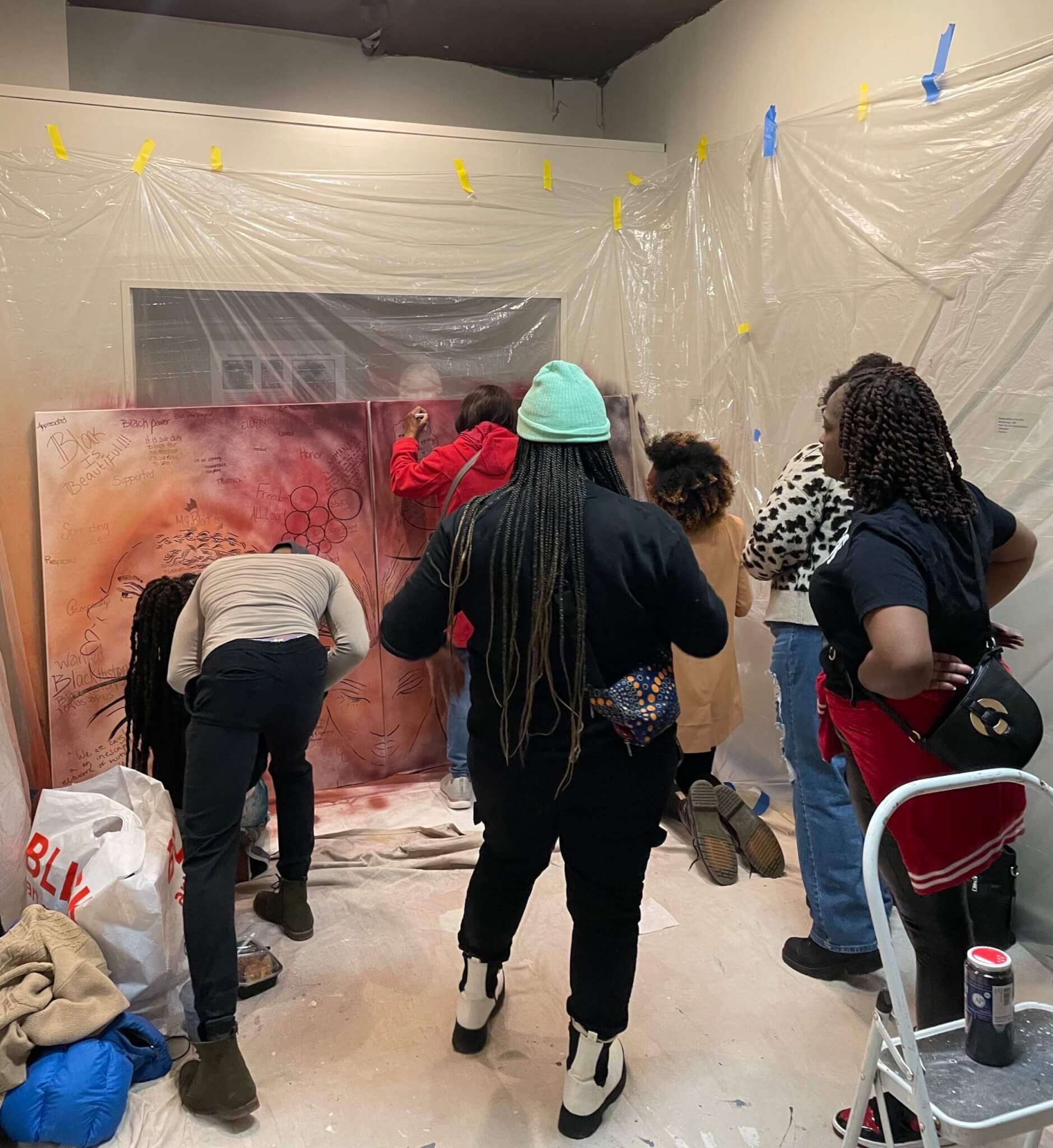
Attendees writing additional intentions for the Black Diaspora on the I AM canvas next to artist Sagie Vangelina (bottom left). Photo by Niara Hightower.
Stay tuned for future programs from the City of Boston Equity and Inclusion Cabinet, including two Black women-centered gatherings in April, as well as National Center of Afro-American Artists and Black Market sponsored events.
